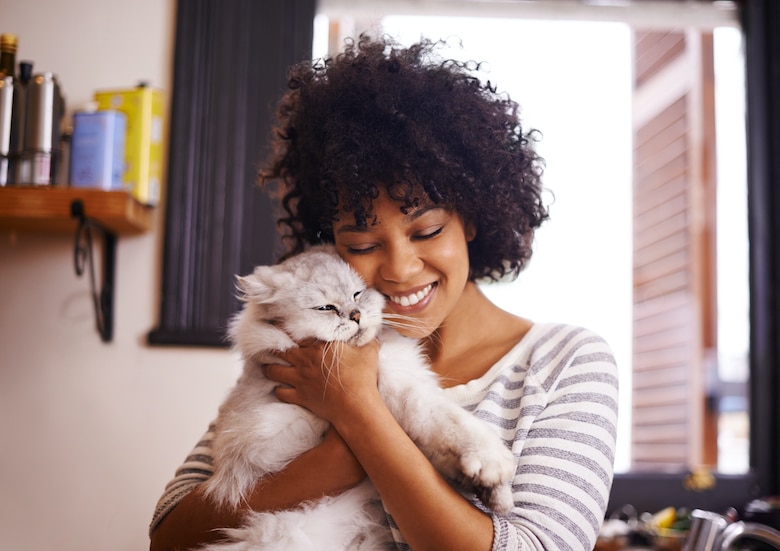As we grapple with life in a global pandemic, most of us are using more hand sanitizer this year than we ever have before. And while hand sanitizer has become an important tool for keeping people safe when we’re unable to access soap and water for washing our hands, it is a chemical. Here’s what cat guardians should know about hand sanitizer and cats.
What exactly is in hand sanitizer?
Different hand sanitizers will have different chemical properties so it’s important to look at the ingredients for any hand sanitizer you are purchasing and using. Generally, though, Dr. Wismer explains, “Hand sanitizer does NOT contain ethylene glycol, the toxic component of antifreeze,” explains Tina Wismer, DVM, Senior Director, ASPCA Animal Poison Control Center.
This is a good thing! Instead, “most hand sanitizers are ethanol based, which is the same type of alcohol that we drink.” Dr. Wismer did note that some hand sanitizers do contain small amounts of polyethylene glycol or propylene glycol which is an ingredient in what is marketed as pet “safe” antifreeze, which isn’t a bad thing.
Is hand sanitizer safe for cats?
Dr. Jamie Richardson, Medical Chief of Staff at Small Door Veterinary explains that “it’s certainly safe to use hand sanitizer on yourself,” however, it’s important to note that hand sanitizer is formulated for use by people and it is not safe for cats. While hand sanitizer isn’t explicitly toxic to cats, you don’t want your cat to get too close to it. Under no circumstances should you put hand sanitizer onto your cat.
Dr. Richardson advises that it’s important to keep hand sanitizer away from your cat’s paws and fur, noting “many cats do not like having topical creams/ointments etc. applied and will attempt to lick them off and could consequently ingest the sanitizer” In addition, if you put hand sanitizer onto your cat’s paws “the high alcohol content could dry out the paw pads, causing cracks, which is not only very painful but could also lead to infection if dirt or bacteria gets into the cracks” Dr. Richardson advises.
Related: Should You Clean Your Cat’s Paws?
The biggest concern around hand sanitizer is if cats were to ingest it. The good thing both Dr. Richardson and Dr. Wismer note is that cats are unlikely to want to drink hand sanitizer. “Most pets will dislike the taste of sanitizer, so if they lick your hand out of curiosity, they are unlikely to do it again! A single lick is also very unlikely to cause your pet harm, due to the small quantity of sanitizer consumed. You may just notice a small amount of drooling from the bad taste” Dr. Richardson advises. That said, if hand sanitizer got onto your cat’s fur and your cat attempted to clean himself, there would be a risk of ingesting a lot of hand sanitizer or that the hand sanitizer could be absorbed through the cat’s skin, which could put your cat at risk of alcohol poisoning.
How to use hand sanitizer if you have a cat
If you are using hand sanitizer it’s best to do so away from your cat. Dr. Wismer advises that when using hand sanitizer, guardians should “refrain from petting your cat until your hands are completely dry.” Although you don’t want to expose your cat to wet hand sanitizer, Dr. Wismer notes that it’s perfectly safe to use hand sanitizer because “once the hand sanitizer has evaporated it is safe to touch your pets without concern.”
What to watch for when using hand sanitizer around your cat?
The biggest concern for cats around-consuming hand sanitizer is the high alcohol content and risk of alcohol poisoning if a large quantity of hand sanitizer is ingested or absorbed through the skin. Dr. Richardson advises that if not treated quickly, alcohol poisoning can be very dangerous or even fatal for cats. Dr. Richardson advises that the most common symptoms to watch for if you believe your cat may have gotten more than a lick of hand sanitizer include:
- Nausea, vomiting or retching
- Drooling
- Lethargy, weakness, disorientation or incoordination
- Collapse
- Slow or difficulty breathing
Because alcohol poisoning can progress quickly if you believe your cat has consumed hand sanitizer it’s best to get your cat to the vet right away to be assessed. To be safe, if you have been purchasing extra hand sanitizer, it’s best to store the hand sanitizer in a cabinet or room of your home that your cat doesn’t have access to prevent your cat from getting into it.
Featured photograph: PeopleImages/Getty Images
Read Next: Helping Our Cats Through the Pandemic





